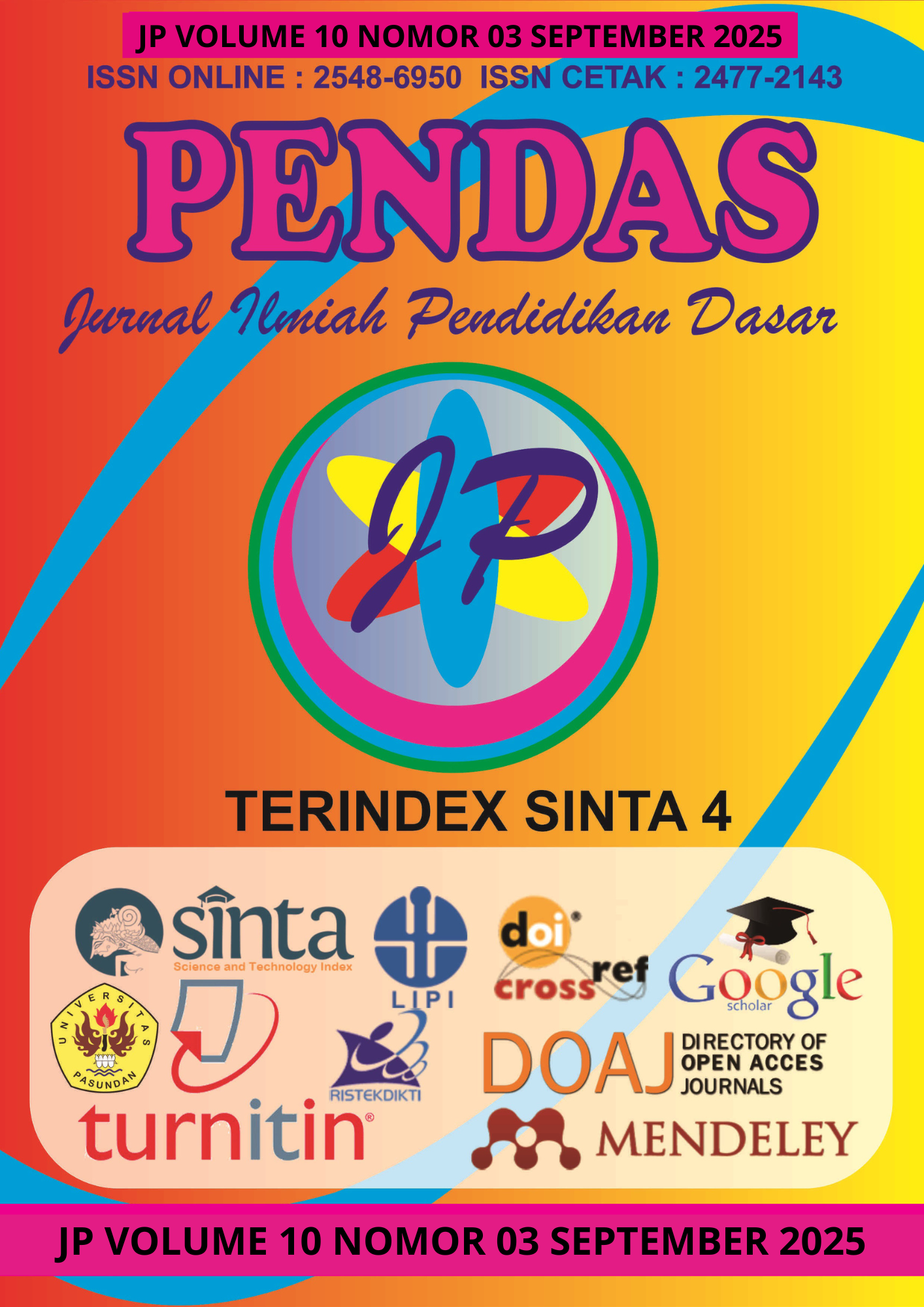PENGARUH PENERAPAN MODEL PROBLEM BASED LEARNING (PBL) TERHADAP KEMAMPUAN BERPIKIR KRITIS SISWA PADA PEMBELAJARAN PAI KELAS IV
DOI:
https://doi.org/10.23969/jp.v10i3.30246Keywords:
critical thinking skills, islamic religious education, problem based learningAbstract
Developing students' critical thinking skills is a crucial part of the classroom learning process. Students can solve difficulties and create logical, coherent, and critical thinking patterns by using these skills in the 21st century. Prioritizing problem-solving in the classroom helps students better understand and remember concepts and knowledge, ultimately improving learning outcomes. Unfortunately, many current teaching methods are still teacher-centered, which makes students obedient, easily distracted, or even distracted in class. This study aims to assess the effects of the Problem-Based Learning (PBL) paradigm on fourth-grade Islamic Religious Education (PAI) students' critical thinking abilities. A Nonequivalent Control Group Design, a quasi-experimental design, was employed in conjunction with a quantitative experimental approach for the goals of this investigation. The analysis's findings indicate that the Problem-Based Learning (PBL) model is a great tool for enhancing students' critical thinking abilities, which makes it a perfect fit for the classroom.
Downloads
References
Adella, B., Marta, R., Pahlawan, U., & Tambusai, T. (2023). Peningkatan Kemampuan Berpikir Kritis Siswa Menggunakan Model Creatif Problem Solving ( Cps ) Di Sekolah Dasar. 9, 149–158.
Ariadila, S. N., Silalahi, Y. F. N., Fadiyah, F. H., Jamaludin, U., & Setiawan, S. (2023). Analisis Pentingnya Keterampilan Berpikir Kritis Terhadap Pembelajaran Bagi Siswa. 9(20), 664–669. https://doi.org/https://doi.org/10.5281/zenodo.8436970
Kushendrawan, A., Miyono, N., & Sofiati, R. N. (2024). Efektivitas Model Pembelajaran Problem Based Learning terhadap Hasil Belajar Matematika Kelas I SD Supriyadi 02 Semarang. Journal on Education, 6(4), 18672–18681. https://doi.org/10.31004/joe.v6i4.5842
Latifa, D. A., Ali, E. Y., Sujana, A., Studi, P., Guru, P., & Dasar, S. (2025). Efektifitas model pembelajaran RADEC terhadap peningkatan kemampuan berfikir kritis peserta didik kelas IV sekolah dasar. 08(01), 55–61.
Lieung, K. W. (2019). Pengaruh Model Discovery Learning terhadap Keterampilan Berpikir Kritis Siswa Sekolah Dasar. Musamus Journal of Primary Education, 1(2), 073–082. https://doi.org/10.35724/musjpe.v1i2.1465
Ni’mah, N. (2022). Analisis Indikator Berpikir Kritis Terhadap Karakter Rasa Ingin Tahu dalam Kurikulum 2013. Anterior Jurnal, 22(Special-1), 118–125. https://doi.org/10.33084/anterior.v22ispecial-1.3220
Ningsih, I. wahyu, Ulfah, Mayasari, A., & Arifudin, O. (2024). Manajemen Pembelajaran Pendidikan Agama Islam dalam Meningkatkan Prestasi Belajar Peserta Didik Di Sekolah Dasar. 5(1), 23–37. https://doi.org/https://doi.org/10.57171/jt.v5i1.203
Nurhidayati, S. (2022). Pengaruh Model Pembelajaran Problem Based Learning (Pbl) Terhadap Kemampuan Berpikir Kritis Siswa Kelas Viii Tahun Pelajaran 2022/2023. AT-TAWASSUTH: Jurnal Ekonomi Islam, VIII(I), 1–19.
Puspita, V., & Dewi, I. P. (2021). Efektifitas E-LKPD berbasis Pendekatan Investigasi terhadap Kemampuan Berfikir Kritis Siswa Sekolah Dasar. Jurnal Cendekia : Jurnal Pendidikan Matematika, 5(1), 86–96. https://doi.org/10.31004/cendekia.v5i1.456
Santi, M. D., Nursyahidah, F., Nugroho, A. A., & Estiyani, E. (2023). Peningkatan Hasil Belajar IPA Melalui Model Problem Based Learning Berbantu Media Canva pada Siswa Kelas V SDN Pandeanlamper 03. Journal on Education, 5(4), 12272–12280. https://doi.org/10.31004/joe.v5i4.2199
Sayangan, Y. V., Una, L. M., & Beku, V. Y. (2024). Penerapan Model Pembelajaran Discovery Learning dalam Meningkatkan Kemampuan Berpikir Kritis Siswa Sekolah Dasar pada Pembelajaran IPAS. Jurnal Pendidikan MIPA, 14(3), 757–766.
Sholikhah, A. N. Y., & Arif, S. (2024). Pengembangan Modul Berbasis STEM 3D untuk Meningkatkan Kemampuan Berpikir Kritis Siswa. Jurnal Tadris IPA Indonesia, 4(1), 127–140. https://doi.org/10.21154/jtii.v4i1.3074
Sihotang, H. (2023). Metode Penelitian Kuantitatif. In Pusat Penerbitan dan Pencetakan Buku Perguruan Tinggi Universitas Kristen Indonesia Jakarta. http://www.nber.org/papers/w16019
Sukarelawa, M. I., Indarto, T. K., & Ayu, S. M. (2024). N-Gain vs Stacking. penerbit suryacahya.
Susanto, P. C., Arini, D. U., Yuntina, L., & Panatap, J. (2024). Konsep Penelitian Kuantitatif : Populasi , Sampel , dan Analisis Data ( Sebuah Tinjauan Pustaka ). 3(1), 1–12. https://doi.org/https://doi.org/10.38035/jim.v3i1.504
Tiara, V., Ninawati, Liska, F., Alya, R., & Barella, Y. (2024). Menggali Potensi Problem Based Learning: Definisi, Sintaks, Dan Contoh Nyata. Sosial: Jurnal Ilmiah Pendidikan IPS, 2(2), 121–128. https://doi.org/https://doi.org/10.62383/sosial.v2i2.153
Yam, J. H., & Taufik, R. (2021). Hipotesis Penelitian Kuantitatif. Perspektif : Jurnal Ilmu Administrasi, 3(2), 96–102. https://doi.org/10.33592/perspektif.v3i2.1540
Yani, M. F. (2023). Efektivitas Problem Based Learning Terhadap Kemampuan Berpikir Kritis Siswa Pada Mata Pelajaran Akidah Akhlak Kelas V Mi Al-Mu’min Sragen Tahun Ajaran 2022/2023. 1–97.
Downloads
Published
Issue
Section
License
Copyright (c) 2025 Pendas : Jurnal Ilmiah Pendidikan Dasar

This work is licensed under a Creative Commons Attribution 4.0 International License.














































